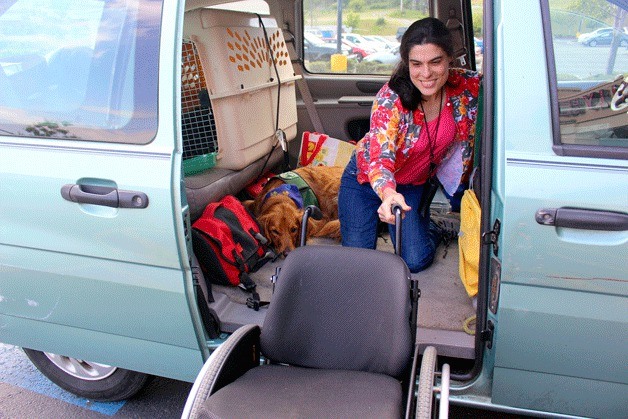Melissa Mitchell always swore she’d drive her van until the wheels fell off.
With 203,000 miles on the odometer, they’re still attached but the front axel broke, the fuel pump died and the radiator went kaput.
While that’s a pain for anybody, it’s particularly devastating for Mitchell. The van is her lifeline and she can’t use any old beater to get to work.
She mainly uses a power wheelchair, and a van outfitted with a lift and hand controls costs in the neighborhood of $50,000 new.
That’s not chump change for Mitchell, who works at a North Whidbey nonprofit training service dogs.
Her friends and family are rallying to give her a chance to win an adapted van, courtesy of a contest run by the National Mobility Equipment Dealers Association, a nonprofit dedicated to expanding mobility options for people with disabilities. The organization is giving away vehicles equipped with the adaptive equipment each winner needs.
“She spends a lot of time crawling in and out of that van, which is on the verge of breaking down again,” said Alice Collingwood, who works with Mitchell.
“It would be just lovely (if she could win). She deserves it.”
Contestants upload a video or written narrative describing how they’re overcoming a disability and anyone can vote for a winner. If you’d like to help her out, you can vote once a day until the end of the month at www.mobilityawarenessmonth.com.
Mitchell was born in San Antonio on a military base in 1978. She arrived early, far too early at 26 weeks. The birth nearly killed her and her mother. The doctors wanted to let her die but her parents fought for her.
She stayed in the hospital two months. But it was once she went home that one final insult to her brain caused cerebral palsy. Her mother stepped away for a few moments, and Mitchell stopped breathing.
Mitchell said she’s thankful she didn’t lose cognitive function. She can’t walk. Her balance is poor, so she runs the risk of falling every time she reaches for something.
She now works for Summit Assistance Dogs, which provides service dogs for free to people who need them.
In Mitchell’s video, she demonstrates how difficult it is to get in the van she’s driving now. It’s not adapted. Since she doesn’t have a lift on her van, she uses a manual wheelchair outside of her home. Her power chair — at 350 pounds — is too heavy for her to yank into the van.
She pulls open the side door, and points at the back seat. Her service dog Tanner, a golden retriever with a fluffy tail, hops into a kennel in the back of the van and patiently watches. Mitchell positions her chair in front of the opening and pushes herself forward headfirst into the van. On her hands and knees she scoots around, pulls the chair in and shuts the door. Then she crawls into the driver’s seat.
The process takes a good 15 minutes.
Mitchell does that every day, multiple times.
“It’s completely exhausting,” she said.
Also it is not the professional impression she’d like to convey, she said. She travels frequently to different locations for work, not only to train the dogs but to meet with clients.
There’s also the very real concern her wheelchair will get loose and roll into traffic. It’s happened and she’s had to flag someone down to retrieve it.
“Having a van would mean I would be in less pain, it would mean I need less help from family, friends, co-workers and strangers when I am out in the community,” Mitchell said. “It would save me hours in time everyday getting in and out, giving me more time and energy to live life to the fullest.”



